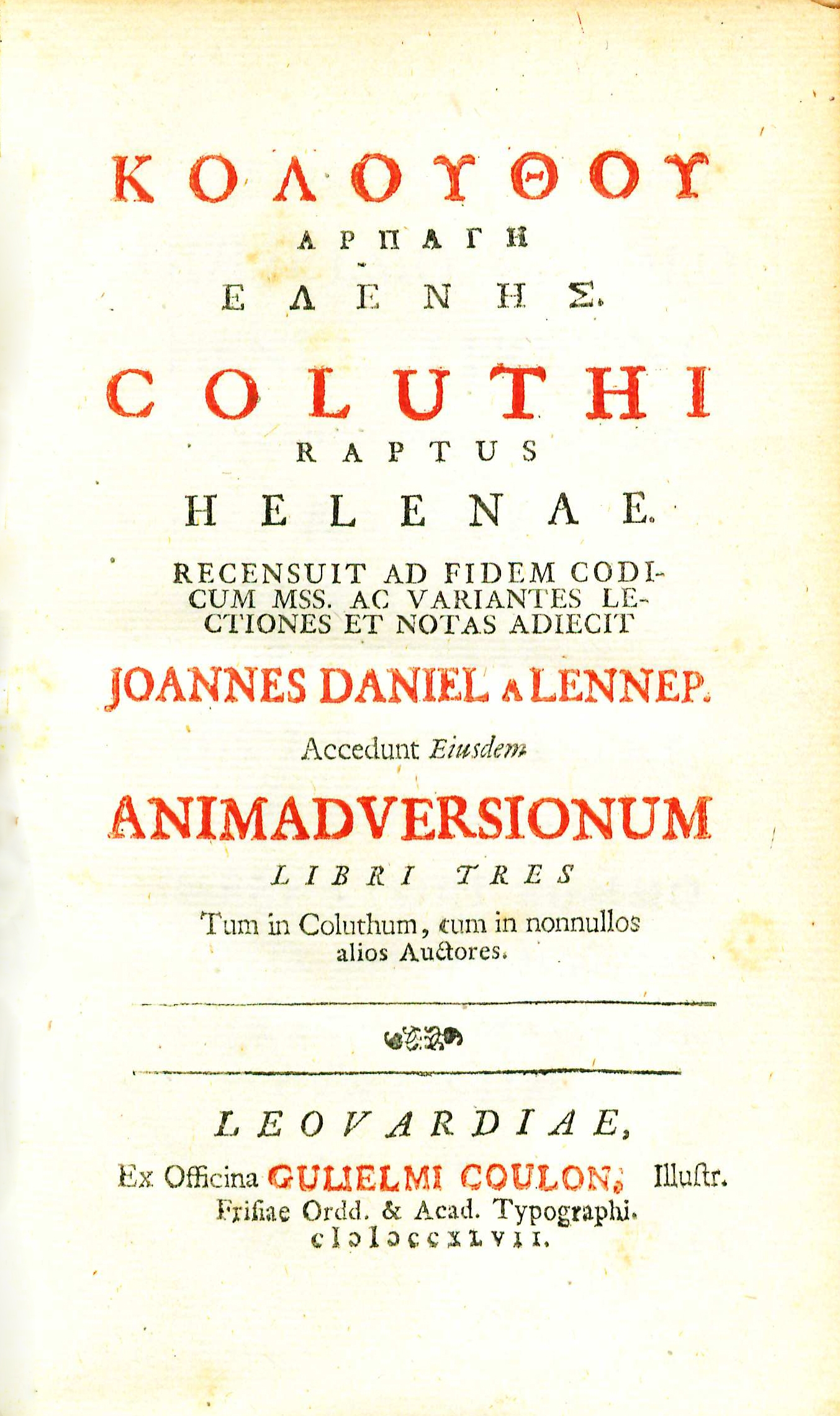Difference between revisions of "Kolouthou Arpagē Helenēo"
| Line 15: | Line 15: | ||
|pages=xxv, [1], 127, 215, [1] | |pages=xxv, [1], 127, 215, [1] | ||
|desc=8vo (21 cm.) | |desc=8vo (21 cm.) | ||
| − | }}Little is known about the classic poet [http://en.wikipedia.org/wiki/Colluthus Colluthus] besides his birthplace of Lycopolis and his single extant work, the narrative poem ''The Rape of Helen'', a mythical story about Helen, the daughter of the god Zeus (or mortal father Tyndareus) and the mortal Leda.<ref>E. Harrison, reviewer. "''Oppian'', ''Colluthus'', ''Tryphiodorus'' by A. W. Mair; ''Athenaeus, ''the Deipnosophists'' by C. B. Gulick; ''Plutarch’s Moralia'' by F. C. Babbitt," ''The Classical Review'' 44, no. 2 (May 1930): 83.</ref> The story revolves around Helen's abudction by Paris, when he took | + | }}Little is known about the classic poet [http://en.wikipedia.org/wiki/Colluthus Colluthus] besides his birthplace of Lycopolis and his single extant work, the narrative poem ''The Rape of Helen'', a mythical story about Helen, the daughter of the god Zeus (or mortal father Tyndareus) and the mortal Leda.<ref>E. Harrison, reviewer. "''Oppian'', ''Colluthus'', ''Tryphiodorus'' by A. W. Mair; ''Athenaeus, ''the Deipnosophists'' by C. B. Gulick; ''Plutarch’s Moralia'' by F. C. Babbitt," ''The Classical Review'' 44, no. 2 (May 1930): 83.</ref> The story revolves around Helen's abudction by Paris, when he took her from Sparta to Troy.<br/> |
<br/> | <br/> | ||
| − | Though the “Rape of Helen” is universally viewed as the proximate cause of the Trojan War, "Helen was merely the instrument employed to initiate the action."<ref>John Reeves, "The Cause of the Trojan War: A Forgotten Myth Revived," ''The Classical Journal'' 61, no. 5 (Feb. 1966): 212.</ref> The underlying cause of the events leading to the war was Zeus' decision to free the earth from some of the oppressiveness of humankind by killing off many people in a war. | + | Though the “Rape of Helen” is universally viewed as the proximate cause of the Trojan War, "Helen was merely the instrument employed to initiate the action."<ref>John Reeves, "The Cause of the Trojan War: A Forgotten Myth Revived," ''The Classical Journal'' 61, no. 5 (Feb. 1966): 212.</ref> The underlying cause of the events leading to the war was Zeus' decision to free the earth from some of the oppressiveness of humankind by killing off many people in a war. It is notable, however, that Colluthus does not address Zeus' purpose in ''The Rape of Helen''.<ref>Ibid.</ref> |
[[File:ColluthusKolouthouArpageHeleneo1747Headpiece.jpg|center|thumb|350px|<center>Headpiece, first page of text.</center>]] | [[File:ColluthusKolouthouArpageHeleneo1747Headpiece.jpg|center|thumb|350px|<center>Headpiece, first page of text.</center>]] | ||
==Evidence for Inclusion in Wythe's Library== | ==Evidence for Inclusion in Wythe's Library== | ||
Revision as of 15:51, 14 March 2014
Kolouthou Arpagē Helenēo = Coluthi Raptus Helenae: Recensuit ad Fidem Codicum Mss. ac Variantes Lectiones et Notas Adiecit Joannes Daniel A Lennep
by Colluthus of Lycopolis
| Kolouthou Arpagē Helenēo = Coluthi Raptus Helenae | |
|
Title page from Kolouthou Arpagē Helenēo = Coluthi Raptus Helenae, George Wythe Collection, Wolf Law Library, College of William & Mary. | |
| Author | Colluthus of Lycopolis |
| Editor | Johannes Daniel van Lennep |
| Published | Leovardiae: Ex officina Gulielmi Coulon |
| Date | 1747 |
| Language | Greek and Latin on opposite pages |
| Pages | xxv, [1], 127, 215, [1] |
| Desc. | 8vo (21 cm.) |
Little is known about the classic poet Colluthus besides his birthplace of Lycopolis and his single extant work, the narrative poem The Rape of Helen, a mythical story about Helen, the daughter of the god Zeus (or mortal father Tyndareus) and the mortal Leda.[1] The story revolves around Helen's abudction by Paris, when he took her from Sparta to Troy.
Though the “Rape of Helen” is universally viewed as the proximate cause of the Trojan War, "Helen was merely the instrument employed to initiate the action."[2] The underlying cause of the events leading to the war was Zeus' decision to free the earth from some of the oppressiveness of humankind by killing off many people in a war. It is notable, however, that Colluthus does not address Zeus' purpose in The Rape of Helen.[3]
Evidence for Inclusion in Wythe's Library
Included in a shipment sent by Thomas Jefferson to Wythe on September 16, 1787. The last two pages of the enclosed letter list the "Contents of the box marked G.W." "Coluthi raptus Helenae" is among the titles in the section "for Mr. Wythe." The precise edition is unknown. This title may also be listed in the Jefferson Inventory of Wythe's Library as "Quintus Coluthus. Gr. Lat. 8vo.", which Jefferson gave to his grandson Thomas Jefferson Randolph. The Brown Bibliography[4] puts the two references together and suggests the 1747 Greek and Latin edition of Kolouthou Arpagē Helenēo edited by Johannes Daniel van Lennep. George Wythe's Library[5] instead inteprets the Jefferson inventory entry as Koïntu Kalabru paraleipomenon Homeru, biblia tessareskaideka by Smyrnaeus Quintus while also including Kolouthou Arpagē Helenēo ("precise edition unknown") based on Jefferson's shipment to Wythe. The Wolf Law Library followed Brown's recommendation and purchased the 1747 edition of Kolouthou Arpagē Helenēo.
Description of the Wolf Law Library's copy
Bound in contemporary calf with gilt panels and decorative gilt double rule compartments on spine. Gilt label on black morocco leather.
View this book in William & Mary's online catalog.
References
- ↑ E. Harrison, reviewer. "Oppian, Colluthus, Tryphiodorus by A. W. Mair; Athenaeus, the Deipnosophists by C. B. Gulick; Plutarch’s Moralia by F. C. Babbitt," The Classical Review 44, no. 2 (May 1930): 83.
- ↑ John Reeves, "The Cause of the Trojan War: A Forgotten Myth Revived," The Classical Journal 61, no. 5 (Feb. 1966): 212.
- ↑ Ibid.
- ↑ Bennie Brown, "The Library of George Wythe of Williamsburg and Richmond," (unpublished manuscript, May, 2012) Microsoft Word file. Earlier edition available at: https://digitalarchive.wm.edu/handle/10288/13433.
- ↑ LibraryThing, s. v. "Member: George Wythe", accessed February 27, 2014.

